English Tea Store
Inspired by the RDJ movie.
I have bought a lot of tea over the years from these people, always with good results.
Tuesday, November 27, 2012
Do you agree?
The top 10 list of Sherlock Holmes influencers
7
Which ten persons – apart from Sir Arthur Conan Doyle himself – have had the biggest influence on the 125 years of Sherlock Holmes? Persons whose decisions – positive or negative – and deeds have changed the future of the detective.
The order is just approximately chronological. And this is of course my personal list. Please comment – or why not write a blog post – if you are of another opinion.
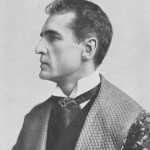 1. William Gillette. It can’t be underestimated what he did for the future of Sherlock Holmes. In a time when the detective actually had ceased to exist (because of that Reichenbach incident), he spread the word of Sherlock Holmes in the US and his 1899 play “Sherlock Holmes” went on to be a success in many of the European countries. He was also the one who made Moriarty into a really known supervillain and not just a character in one single short story. And when the Royal Shakespeare Company played Gillette’s “Sherlock Holmes” in 1974, it was the start of a new Holmes boom.
1. William Gillette. It can’t be underestimated what he did for the future of Sherlock Holmes. In a time when the detective actually had ceased to exist (because of that Reichenbach incident), he spread the word of Sherlock Holmes in the US and his 1899 play “Sherlock Holmes” went on to be a success in many of the European countries. He was also the one who made Moriarty into a really known supervillain and not just a character in one single short story. And when the Royal Shakespeare Company played Gillette’s “Sherlock Holmes” in 1974, it was the start of a new Holmes boom. 2. Ronald Knox. His 1911 essay “Studies in the Literature of Sherlock Holmes” started the world of Sherlockiana. He didn’t mean to do exactly that, he just wanted to do a satirical attack on the higher criticism of the Bible. Which is also the reason why Sherlockians e.g. use the word “Canon” when they talk about Conan Doyle’s Holmes stories.
2. Ronald Knox. His 1911 essay “Studies in the Literature of Sherlock Holmes” started the world of Sherlockiana. He didn’t mean to do exactly that, he just wanted to do a satirical attack on the higher criticism of the Bible. Which is also the reason why Sherlockians e.g. use the word “Canon” when they talk about Conan Doyle’s Holmes stories.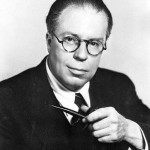 3. Christopher Morley. When he founded The Baker Street Irregulars in 1934, he formed the base for worldwide continued interest in Sherlock Holmes. Thanks to the many Sherlockian societies, people have had a chance to get together with a common interest, which among other things has stimulated the writing of a lot of books, both non-fiction and fiction. There had certainly been literary societies, but they had probably been concentrated on Conan Doyle, since such societies normally circle around the author.
3. Christopher Morley. When he founded The Baker Street Irregulars in 1934, he formed the base for worldwide continued interest in Sherlock Holmes. Thanks to the many Sherlockian societies, people have had a chance to get together with a common interest, which among other things has stimulated the writing of a lot of books, both non-fiction and fiction. There had certainly been literary societies, but they had probably been concentrated on Conan Doyle, since such societies normally circle around the author.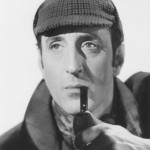 4. Basil Rathbone. It wasn’t Basil Rathbone’s decision to make the films in which he plays Sherlock Holmes, and maybe another actor could have played the detective. But the way Rathbone played Holmes made the detective even more an icon, for many years to come. From the ’40s to the mid ’80s this was what Sherlock Holmes looked like. And sounded – we should not forget all the radio plays!
4. Basil Rathbone. It wasn’t Basil Rathbone’s decision to make the films in which he plays Sherlock Holmes, and maybe another actor could have played the detective. But the way Rathbone played Holmes made the detective even more an icon, for many years to come. From the ’40s to the mid ’80s this was what Sherlock Holmes looked like. And sounded – we should not forget all the radio plays!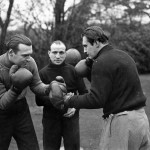 5. Adrian Conan Doyle & Denis Conan Doyle. Okay, I know they are two persons, but they together represent an era, when they ruled – or at least tried to rule – over everything Sherlockian. They made life difficult for pastiche writers and they decided who was to make Sherlock Holmes films and such. In their decisions they of course made many good things, but in guarding the copyright (and their own fortunes) they stopped a lot of interesting Sherlock Holmes projects.
5. Adrian Conan Doyle & Denis Conan Doyle. Okay, I know they are two persons, but they together represent an era, when they ruled – or at least tried to rule – over everything Sherlockian. They made life difficult for pastiche writers and they decided who was to make Sherlock Holmes films and such. In their decisions they of course made many good things, but in guarding the copyright (and their own fortunes) they stopped a lot of interesting Sherlock Holmes projects.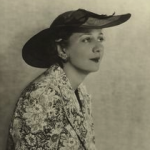 6. Princess Nina Mdivani Conan Doyle Harwood. The widow of Denis Conan Doyle. She really messed things up in the ’70s. I don’t know about all the legal things, but the copyright issues regarding the Sherlock Holmes stories became very complicated because of all her affairs. And regarding “princess” – well, she wasn’t really one, but that’s another story…
6. Princess Nina Mdivani Conan Doyle Harwood. The widow of Denis Conan Doyle. She really messed things up in the ’70s. I don’t know about all the legal things, but the copyright issues regarding the Sherlock Holmes stories became very complicated because of all her affairs. And regarding “princess” – well, she wasn’t really one, but that’s another story…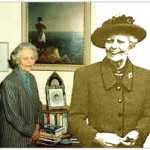 7. Dame Jean Conan Doyle. After Adrian Conan Doyle’s death in 1970, she was the only surviving child of Sir Arthur Conan Doyle. Her feelings towards the pastiches and film/tv productions were much warmer than the ones expressed by her brothers – even if she absolutely had opinions about certain books. She died in 1997. As Christopher Redmond put it in a tweet to me: She re-established a “Doyle estate” with some copyright control; encouraged the growth of ACD studies.
7. Dame Jean Conan Doyle. After Adrian Conan Doyle’s death in 1970, she was the only surviving child of Sir Arthur Conan Doyle. Her feelings towards the pastiches and film/tv productions were much warmer than the ones expressed by her brothers – even if she absolutely had opinions about certain books. She died in 1997. As Christopher Redmond put it in a tweet to me: She re-established a “Doyle estate” with some copyright control; encouraged the growth of ACD studies. 8. Nicholas Meyer. His 1974 book “The Seven-Per-Cent Solution” started the Sherlock Holmes pastiche boom – and he sold two million copies. His pastiche style was a new one – he was the one who started the tradition with an “editor” (i.e. the author himself) finding an old Watson manuscript. And he was also one of the first who let Holmes meet famous persons of the late 19th century and early 20th century.
8. Nicholas Meyer. His 1974 book “The Seven-Per-Cent Solution” started the Sherlock Holmes pastiche boom – and he sold two million copies. His pastiche style was a new one – he was the one who started the tradition with an “editor” (i.e. the author himself) finding an old Watson manuscript. And he was also one of the first who let Holmes meet famous persons of the late 19th century and early 20th century.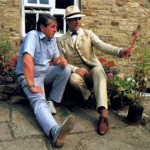 9. Michael Cox & Jeremy Brett. The Granada tv series about Sherlock Holmes was of course a team effort, and there were many more important persons in the production. But in the centre were the producer Michael Cox and the actor Jeremy Brett. And it’s impossible to separate Cox and Brett at this top 10 list. As Trevor Hancock wrote in a tweet to me: Brett was the heart, Cox the brain.
9. Michael Cox & Jeremy Brett. The Granada tv series about Sherlock Holmes was of course a team effort, and there were many more important persons in the production. But in the centre were the producer Michael Cox and the actor Jeremy Brett. And it’s impossible to separate Cox and Brett at this top 10 list. As Trevor Hancock wrote in a tweet to me: Brett was the heart, Cox the brain. 10. Steven Moffat & Mark Gatiss. Of course Benedict Cumberbatch and Martin Freeman are important – and absolutely essential – for the success of the BBC series “Sherlock”, but never before has the persons behind a Sherlock Holmes production been so much in focus. Which they absolutely deserve! They have reinvented the detective. Thanks to “Sherlock” there is a huge new interest in Sherlock Holmes, maybe bigger than ever before.
10. Steven Moffat & Mark Gatiss. Of course Benedict Cumberbatch and Martin Freeman are important – and absolutely essential – for the success of the BBC series “Sherlock”, but never before has the persons behind a Sherlock Holmes production been so much in focus. Which they absolutely deserve! They have reinvented the detective. Thanks to “Sherlock” there is a huge new interest in Sherlock Holmes, maybe bigger than ever before.
And 10 runners-up
Dr. Joseph Bell (the model for Holmes), Herbert Greenhough Smith (editor at The Strand Magazine), Sidney Paget (British illustrator), Frederic Dorr Steele (American illustrator), P. G. Wodehouse (invented in 1915 the expression “Elementary, my dear Watson!”), Vincent Starrett (author of “The Private Life of Sherlock Holmes” and one of the first real Sherlockians), Edgar W. Smith (key Sherlockian in BSI), Sheldon Reynolds(producer of influential TV series in the ’50s), William S. Baring-Gould (author of “Sherlock Holmes of Baker Street” and editor of “The Annotated Sherlock Holmes”), John Bennett Shaw (the world’s greatest Sherlock Holmes collector and one of the most famous Sherlockians).
Thanks to Christopher Redmond, Vincent W. Wright, Lasse Lohse, Kathryn Davies, Trevor Hancock and Per Olaisen for great input on Twitter and Facebook when I prepared for this blog post! Especially Christopher has suggested many of the names for the runners-up – and how to squeeze 13 persons into the top 10 list…
(The photos in this blog post are unfortunately used without permission… Please, let me know if you want me to remove any of them.)
Good sketch. . .
Sherlock
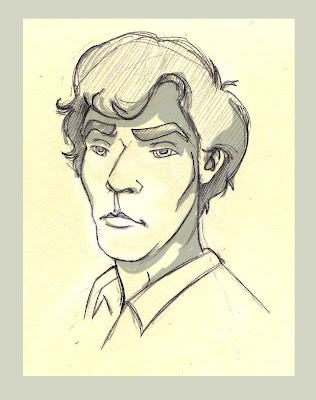
If you've never heard of it, WHERE HAVE YOU BEEN, and if you're not watching it, what the hell is wrong with you?
I am obviously referring to Martin Gattiss's and Steve Moffat's 'Sherlock' of BBC fame, not the ridiculous, clunking behemoth travesty that is Guy Ritchie's 'Sherlock Holmes' franchise.
Emphasis on the inverted quotation marks. It's not that I have a problem with Robert Downey Jnr or Jude Law, what I have a problem with is the shameless sexing up of a literary character combined with absoloutely no regard for the original source material whatsoever. They could've called it anything at all given the relativity to Arthur Conan Doyle's short stories, but 'Sherlock' is obviously a recognisable cultural character, thus, less of a gamble than say - gasp - making anoriginal film.
Rant over.
The BBC adaptation draws far more from the original Sherlock, albeit with the necessary sexing up, and works fabulously for it. Benedict Cumberbatch has the most amazing, alien-y (in a good way) face. Thus far he has succeeded in eluding my attempts to pin him to paper, after 'Tinker, Tailor' last year I tried in vain for days to get a likeness I was happy with, to no avail. It's the mouth. I'm never very good at mouths.
So I've just spent a morning off work doodling carelessly away, until I've finally got close-to-happy-with. It's not terrible, anyway.
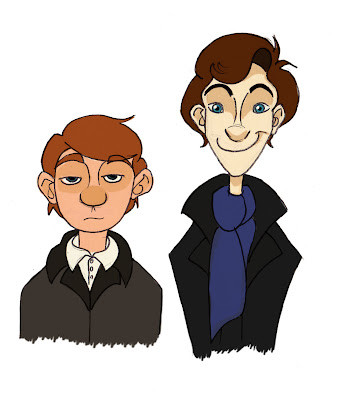
This ridiculous Sesame Street-ish cartoon, however, I have no defence for.
Saturday, November 24, 2012
Friday, November 23, 2012
Wednesday, November 21, 2012
Tuesday, November 20, 2012
Monday, November 19, 2012
Friday, November 16, 2012
My review of Episode #6
I am a little late in getting this one in. . . but we have been visiting the House of Mouse and just got back so I am in catch up mode.
I think this episode, 'Flight Risk', is one of may favorites so far.
To me it feels like Lucy Liu and Johnny Lee Miller have really hit there stride with this one.
The turmoil going on individually within each character really comes across; Watson's somewhat loss of self esteem, and Sherlock's still lack of direction.
We see some great deduction work at the crash site and throughout the show. His observation skills are also well showcased in this episode.
We also see the building of, what we as readers see as canonical settings in the books, still growing within this episode.
We have already noticed in other episodes 'Holmes' using file boxes as his A to Z books, and he once again does the same in this case.
We see, a couple of times in this episode, 'Holmes' knowledge of his surroundings as in the case of what types of water are found near his stomping grounds.
We also see his knowledge of chemistry in his examination of the sands.
Where in the books we read of Sherlock reading all the daily papers to get his information and knowledge of crimes going on, in this episode we see that in his use of scanners to keep up with police business.
We see a reference to his abilities as a showman and interest in theatrics, which may be used later.
I am still not sure where all the references to his father is going to lead, and it is slightly unfortunate that this show has followed the often used path of Sherlock having had a bad childhood to explain his behavior.
I think it can be argued that this is one of the best shows so far giving Watson, male or female, almost equal footing in importance to the stories. 'Watson' comes across with some very important insights in this case and is just fine at making her own deductions and observations.
I loved his explanation for his reluctance to fly.
Were there shades of Bruce-Partington Plans here, with the murder taking place in one place and a mode of of transportation dropping it, the body, somewhere else?
It's going to be interesting to see how Irene Adler plays out.
Five out of Five pipes for me.
I think this episode, 'Flight Risk', is one of may favorites so far.
To me it feels like Lucy Liu and Johnny Lee Miller have really hit there stride with this one.
The turmoil going on individually within each character really comes across; Watson's somewhat loss of self esteem, and Sherlock's still lack of direction.
We see some great deduction work at the crash site and throughout the show. His observation skills are also well showcased in this episode.
We also see the building of, what we as readers see as canonical settings in the books, still growing within this episode.
We have already noticed in other episodes 'Holmes' using file boxes as his A to Z books, and he once again does the same in this case.
We see, a couple of times in this episode, 'Holmes' knowledge of his surroundings as in the case of what types of water are found near his stomping grounds.
We also see his knowledge of chemistry in his examination of the sands.
Where in the books we read of Sherlock reading all the daily papers to get his information and knowledge of crimes going on, in this episode we see that in his use of scanners to keep up with police business.
We see a reference to his abilities as a showman and interest in theatrics, which may be used later.
I am still not sure where all the references to his father is going to lead, and it is slightly unfortunate that this show has followed the often used path of Sherlock having had a bad childhood to explain his behavior.
I think it can be argued that this is one of the best shows so far giving Watson, male or female, almost equal footing in importance to the stories. 'Watson' comes across with some very important insights in this case and is just fine at making her own deductions and observations.
I loved his explanation for his reluctance to fly.
Were there shades of Bruce-Partington Plans here, with the murder taking place in one place and a mode of of transportation dropping it, the body, somewhere else?
It's going to be interesting to see how Irene Adler plays out.
Five out of Five pipes for me.
Monday, November 5, 2012
List of presentations for the Harpooners of 2013
2013 – Twenty-fifth Year – Klinger Order (Sixth, and Last, Year)
V. Case-Book
289/53 January (25th) Lion Warren Speh/11
290/54 February (22nd) Veil Robert Rath/3
291/55 March (22nd) Shos
292/56 April (26th) Reti Michael Bragg/21
VI - IX. Novelettes
VI. Study in Scarlet
293/57 May (17th) Stud I
294/57 June (28th) Stud II
VII. Sign of Four
295/58 July (26th) Sign I
296/58 August (23rd) Sign II JAndrew Basford/12
VIII. Valley of Fear
297/59 September (20th) Vall I
298/59 October (18th) Vall II
IX. Hound of the Baskervilles
299/60 November (15th)22 Houn I (Wayne Flynn/)
300/60 December (20th) Houn II (Wayne Flynn/)
www.harpooners.org
Elementary #5 - a review
I really liked this episode and I think all the characters involved are really growing with the show.
I think of all the canonical cases that could be captured in any of the shows, this episode probably had the least amount (so far) of identifiable individual canonical stories, while at the same time offering many 'traits' we have become so use to in the tales
We have reference to Holmes' bee keeping interests.
We have Holmes barricading himself in the hospital room to keep others from destroying evidence by trampling all over it.
His knowledge of chemistry and biology is wonderfully done in the exchange with Watson over dinner plans of sushi.
We see a display of his lack of concern or respect for ones social standing by his treatment of the head doctor and the hospital administrator.
The experimenting on a corpse.
And probably a few I have missed.
Throughout the canon, it has often been argued, that Holmes would not exist without Watson and, of course, that Watson would not exist without Holmes.
I think this episode displays this better than any others so far.
Lucy Liu's Watson is always a grounding force for Holmes, being perhaps his only real touch with reality. Miller's Holmes is played well as a socially immature individual who would probably not really find his true potential without Watson's guidance.
Lucy Liu's Watson, unfortunately could not use Afghanistan as the place where she received her wounds, so the writers devised a closer to home source for the injuries.
When we read the canon, we learn that Watson is an emotional wreck when first he encounters Holmes, and throughout the tales Watson gradually heals and goes back into practice.
Liu's Watson is suffering emotional injuries from occurrences in her career, and slowly throughout these early episodes we see Holmes, whether intentually or not, helping Watson deal with those wounds.
I felt this episode really handled that well.
I also think some of Holmes' skills at observation and deduction are really being handle well in some of the more comical exchanges throughout the show.
I think of all the canonical cases that could be captured in any of the shows, this episode probably had the least amount (so far) of identifiable individual canonical stories, while at the same time offering many 'traits' we have become so use to in the tales
We have reference to Holmes' bee keeping interests.
We have Holmes barricading himself in the hospital room to keep others from destroying evidence by trampling all over it.
His knowledge of chemistry and biology is wonderfully done in the exchange with Watson over dinner plans of sushi.
We see a display of his lack of concern or respect for ones social standing by his treatment of the head doctor and the hospital administrator.
The experimenting on a corpse.
And probably a few I have missed.
Throughout the canon, it has often been argued, that Holmes would not exist without Watson and, of course, that Watson would not exist without Holmes.
I think this episode displays this better than any others so far.
Lucy Liu's Watson is always a grounding force for Holmes, being perhaps his only real touch with reality. Miller's Holmes is played well as a socially immature individual who would probably not really find his true potential without Watson's guidance.
Lucy Liu's Watson, unfortunately could not use Afghanistan as the place where she received her wounds, so the writers devised a closer to home source for the injuries.
When we read the canon, we learn that Watson is an emotional wreck when first he encounters Holmes, and throughout the tales Watson gradually heals and goes back into practice.
Liu's Watson is suffering emotional injuries from occurrences in her career, and slowly throughout these early episodes we see Holmes, whether intentually or not, helping Watson deal with those wounds.
I felt this episode really handled that well.
I also think some of Holmes' skills at observation and deduction are really being handle well in some of the more comical exchanges throughout the show.
Friday, November 2, 2012
Until I get around to my review. . . .
Writers can lose old fans with new works
By MICHAEL CHASIN · Daily Trojan
Much like the way a live performer might have to take the stage following a co-star’s brilliant performance, a successful writer might have to contend with following a tough act — with one difference.

They have only themselves to blame.
Though many aspiring creators imagine that achieving mainstream success will put an end to all their concerns, the opposite is often true. Again and again, the career paths of major writers indicate that the popular novel, for some, is not a learned form but a chance event. The majority of writers will never know what success feels like firsthand, except perhaps as a one-time occurrence.
Mary Shelley once claimed that some people only have one good novel in them, and considering the small number of people who have read any of her post-Frankenstein creations, she would certainly know. Perhaps it would have been more accurate for her to say that some people only have one truly resonant novel in them, and, as a result, struggle to capture that bottled lightning a second time. Considering that writers from Aldous Huxley to Joseph Heller never quite managed it, clearly this is easier said than done.
The luckier breed of one-hit-wonder authors are the ones who produce not one renowned work, but a beloved series that they are then able to explore over multiple volumes. But at its worst, this trend can leave writers feeling trapped by their own creations.
Sir Arthur Conan Doyle grew weary of writing Sherlock Holmes stories and, in his frustration, eventually killed off the Baker Street detective in The Final Problem. Yet he underestimated the devotion of his fans. The outcry from his readers was impossible to ignore and — compelled also by a very real need to pay the bills — Doyle brought Holmes back to life and went right back to chronicling his and Watson’s exploits.
Even more extreme was the case of L. Frank Baum, who wanted to focus on books outside the land of Oz. Unfortunately, nothing else he wrote sold particularly well, forcing him to go over the rainbow time and time again. He put his foot down with The Emerald City of Oz, declaring it the end to the series, but monetary woes eventually led him to write eight more Oz books.
The desire for familiarity and for stories to continue is nothing new, and with mass media being the franchise game that it is, there’s greater incentive than before for writers to stick with what’s made them popular.
So just imagine the pressure J.K. Rowling felt to churn out another book about witches and wizards. As the first person to become a billionaire through writing alone, Rowling was free from any of the financial pressures that Baum or Doyle labored under, she wasn’t free from publishers, Warner Bros. and fans eager to see more of Harry and his world. As the author who inspired an entire generation of readers, giving into the demands of the ever-faithful followers must have been tempting.
And many writers would be happy to stay in the world they’d created. Lemony Snicket, for example, is publishing the first installment of a four-book prequel to his Series of Unfortunate Events later this month — and there’s absolutely nothing wrong with that.
Rowling, though, was itching to do something completely different with her first non-Potter work. Now dominating the display shelves of every major bookstore in the country, The Casual Vacancy is a magic-free, firmly adult tale of small town politics filled with enough sex and social satire to deeply confuse the millions of unwitting children who might be expecting more of the same from the woman who introduced them to Quidditch. That the two most popular ratings for the book on Amazon are one and five stars is not exactly shocking, and when the dust settles, the Harry Potter fandom might find itself decisively split between those who love only Rowling’s magnum opus and those open to what else she has to offer as a writer.
But this doesn’t mean that Rowling’s ruled out the possibility of returning to Harry’s world at a later point in her career. She hasn’t said anything concretely either way, avoiding Doyle and Baum’s mistake of burning a bridge she might someday hope to cross. In a way, it’s refreshing she doesn’t claim the foresight to know everything she’ll ever want to do. Though it might be frustrating not to have a definitive answer as to Rowling’s intentions for her literary future, fans should take comfort in knowing that if she returns to the world that gave her fortune and fame, it won’t be because she needs to or because they asked, but because there was more to say and more stories to tell.
Ideally, that’s the only motivation that matters.
Michael Chasin is a sophomore majoring in narrative studies. His column “Fandomination” runs Fridays.
Thursday, November 1, 2012
And to keep the ball rolling. . .
‘Elementary’ Casts ‘House’s’ Lisa Edelstein In Season 1 Role
4 weeks ago by Scott Stoute

House alum Lisa Edelstein is moving from the hospital room to the boardroom by guest-starring on CBS’ modern-day Sherlock Holmes revival, Elementary. Dropping by in the seventh episode of the season, Edelstein will play a charismatic CEO of a high-end PR consultancy named Heather Vanowen.
Vanowen is labeled as a smart and confident businesswomen, who will cross-purposes with the brilliant detective Sherlock Holmes (Jonny Lee Miller) during his investigation into a deadly bombing that appears to be linked to her company.
Butting-heads with eccentric geniuses is nothing new for Edelstein, who is probably best known for her role as the uptight hospital administrator Dr. Lisa Cuddy on Fox’s long-running medical drama, House. Fans of the superhero-genre may not readily recognize Edelstein’s face, but perhaps remember her voice work as Lex Luthor’s Amazonian bodyguard/personal assistant, Mercy Graves, in Superman: The Animated Series, Justice League and Justice League Unlimited.
Following the House finale, Edelstein appeared in a multi-episode guest-spot onThe Good Wife as Will Gardner’s (Josh Charles) feisty ex, Celeste Serano; she also appeared on Children’s Hospital as both herself and her popular Housecharacter, Lisa Cuddy. This year Edelstein co-starred in the Lifetime movie, Blue-Eyed Butcher.
Also joining Edelstein for some Sherlockian-shenanigans is actress Callie Thorne (Necessary Roughness) who pops in around episode 6 as Terry D’Amico, a veteran NYPD detective and Captain Gregson’s (Aidan Quinn) former partner. It turns out that she and the captain impulsively imprisoned the wrong man for a string of deadly home invasions years ago. Currently, Thorne’s character is excepted to be a recurring role.
Elementary stars Jonny Lee Miller as the brilliant (and recently sober) detective Sherlock Holmes, who is currently living in New York after attending rehab. Actress Lucy Liu stars as Dr. Joan Watson, who lives with Holmes as his “sober companion” to assist his transition from rehab into regular life. Last weekElementary’s premiere episode pulled in a total of 13.4 million viewers and a 3.1 demo rating, which placed the CBS’ updated Holmesian drama at second (on both counts) for any new drama series.
-
Catch Elementary airs Thursdays @ 10/9c on CBS
Source: TV Line.
12

House alum Lisa Edelstein is moving from the hospital room to the boardroom by guest-starring on CBS’ modern-day Sherlock Holmes revival, Elementary. Dropping by in the seventh episode of the season, Edelstein will play a charismatic CEO of a high-end PR consultancy named Heather Vanowen.
Vanowen is labeled as a smart and confident businesswomen, who will cross-purposes with the brilliant detective Sherlock Holmes (Jonny Lee Miller) during his investigation into a deadly bombing that appears to be linked to her company.
Butting-heads with eccentric geniuses is nothing new for Edelstein, who is probably best known for her role as the uptight hospital administrator Dr. Lisa Cuddy on Fox’s long-running medical drama, House. Fans of the superhero-genre may not readily recognize Edelstein’s face, but perhaps remember her voice work as Lex Luthor’s Amazonian bodyguard/personal assistant, Mercy Graves, in Superman: The Animated Series, Justice League and Justice League Unlimited.
Following the House finale, Edelstein appeared in a multi-episode guest-spot onThe Good Wife as Will Gardner’s (Josh Charles) feisty ex, Celeste Serano; she also appeared on Children’s Hospital as both herself and her popular Housecharacter, Lisa Cuddy. This year Edelstein co-starred in the Lifetime movie, Blue-Eyed Butcher.
Also joining Edelstein for some Sherlockian-shenanigans is actress Callie Thorne (Necessary Roughness) who pops in around episode 6 as Terry D’Amico, a veteran NYPD detective and Captain Gregson’s (Aidan Quinn) former partner. It turns out that she and the captain impulsively imprisoned the wrong man for a string of deadly home invasions years ago. Currently, Thorne’s character is excepted to be a recurring role.
Elementary stars Jonny Lee Miller as the brilliant (and recently sober) detective Sherlock Holmes, who is currently living in New York after attending rehab. Actress Lucy Liu stars as Dr. Joan Watson, who lives with Holmes as his “sober companion” to assist his transition from rehab into regular life. Last weekElementary’s premiere episode pulled in a total of 13.4 million viewers and a 3.1 demo rating, which placed the CBS’ updated Holmesian drama at second (on both counts) for any new drama series.
-
Catch Elementary airs Thursdays @ 10/9c on CBS
Source: TV Line.
Primed for tonight's episode. . .
Elementary brings a new kind of Sherlock to TV
By NICHOLAS SLAYTON · Daily Trojan
Posted Yesterday at 9:52 pm in Lifestyle
Even those who never picked up one of Sir Arthur Conan Doyle’s stories nor looked at one of the adaptations know the character Sherlock Holmes. He’s been portrayed as everything from a drugged-up delusional madman to a buffoon to a near-omniscient genius — always a brilliant but flawed man.
It’s odd, then, that the latest Holmes adaptation is getting so much hatred from fans of another major television version. Elementary, CBS’s new Thursday night drama, has been under attack by some fans of BBC’s Sherlock. Both shows feature Holmes and Watson solving mysteries in the 21st century, but some Sherlock fans are denouncing Elementary as a ripoff or simply inferior and not worthy of Conan Doyle’s vision. Not only are those arguments premature, they’re wildly off base, especially since Elementary is quite good.
But first, some background: The idea of modernizing Holmes is nothing new. Basil Rathbone’s series of Holmes films in the 1930s and 1940s brought Holmes into the present day after a few adventures. BBC’sSherlock was the first to bring Holmes into the new millennium, part of a recent trend to try to do Doyle justice.
But until recently, Holmes has been based more on a stereotype or parody of the character. Rathbone’s films, however enjoyable, helped push the image of the detective always clad in a deerstalker cap. And Nigel Bruce’s comedic relief forever marred the character of Dr. Watson as a large idiot, constantly having to be told the obvious.
Jeremy Brett, in a series of adaptations in the 1980s, brought Doyle’s text to life by providing the truest-to-the-books, Victorian version of the character. In terms of series length and accuracy, this television series is the best attempt to adapt the books to the screen.
But in the last few years, there has been an attempt to return to Doyle’s takes on Holmes and Watson that, although lacking the length of Brett’s run, stay true to the books.
Guy Ritchie’s two Sherlock Holmes films, even with a very kinetic and manic tone, are the best recent take on the characters yet. Jude Law’s Watson is probably the best portrayal of the doctor, very much the opposite of Bruce’s buffoon. Game of Shadows featured not only Jared Harris’s perfect Moriarty, but also a version of “The Final Problem” that did the story justice.
BBC’s Sherlock is full of references to Doyle’s text and crams numerous story plots into each episode of its very short seasons. Benedict Cumberbatch’s Holmes is very inhuman and distant, and the episodes themselves have far higher stakes than the original stories do, especially in the second season. It’s a great show, but perhaps suffers from trying to do too much at one time.
Both of these are equally valid versions of Sherlock Holmes. And with Elementary, there is now a third great, valid take on the Great Detective.
Though it’s still early in its season, the show is already showing itself to be a success. And that success comes from its cast.
Doyle described Holmes as Bohemian, brilliant, acerbic and troubled with boredom. Jonny Lee Miller’s Holmes is all that, and also very human. His take on the character is the center of a rather fun spin on the Holmes mythology.
In CBS’s version, Holmes is still a whip-smart consulting detective, but something happened to him in London that forced him to worsen his drug addiction. After a stint in rehab, he’s moved to New York City, where he is set up with a sober companion, former surgeon Joan Watson (Lucy Liu).
As Holmes, Miller is a broken genius. Instead of the more omniscient takes on the character by Rathbone and Cumberbatch, Miller’s version of Holmes doesn’t instantly figure things out. He can still deduce answers easily and is still the smartest person in the room, but he has to do more legwork. And the drug addiction element isn’t just for set up; it plays deeply into a self-loathing Holmes. The mystery of what exactly happened to him in London looks to be a driving force behind the show and one that serves both the plot and the character.
Liu’s Watson is equally interesting. Watson isn’t a simpleton, but rather a force of seriousness next to Holmes’ sarcastic nature and eccentricities. The chemistry between the two is platonic, which is odd for television. The interactions between Liu and Miller, then, can be more fascinating than the cases they’re solving.
Elementary dives into aspects either ignored or marginalized by other recent versions. Holmes’ NYPD contact, Gregson (Aidan Quinn), comes from the original stories, as does Holmes’ drug addiction. It’s a fresh element that helps set the show apart.
If there’s a major problem with Elementary as it starts its first season, it’s that it’s a procedural. Crime procedurals basically blot television today, offering formulaic series where each episode is just a “case of the week” instead of serialized stories or a greater mythology. Elementary is helped by the fact that it’s Sherlock Holmes lending his unique form of deduction and crime fighting to solve each case. But the mysteries themselves, although somewhat clever, feel generic.
Elementary is a great take on the Great Detective and has strong promise. It’s unique from other adaptations, but still a valid and interesting look at Doyle’s hero. If it can bring in more of Doyle’s cases and story elements rather than more generic crimes of the week then it could be one of the best Sherlock Holmes adaptations yet. Until it does, it’s a flawed but good show, well worth checking out.
Subscribe to:
Posts (Atom)













